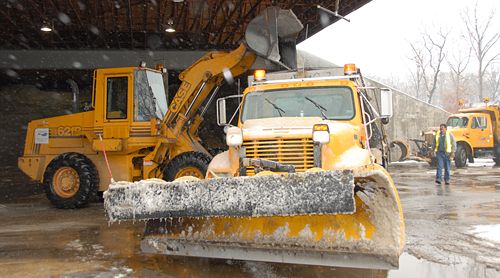133.1 Materials for Snow and Ice Control
Contents
133.1.1 Liquid Chemical
Brine, for both pre-treatment and pre-wetting, is to be made using rock salt (sodium chloride). Liquid Calcium Chloride may be used in extremely cold temperatures when brine is less effective.
- Reasons for policy: Sodium chloride is as effective as calcium chloride at temperatures above 20° F and is less expensive.
- Effective Date: 6/1/99
- Revision Dates: 6/17/03
133.1.2 Storage
Chemicals and stockpiles of treated abrasives are to be stored in a manner to prevent loss of material and prevent damage to state or private property. All bulk salt shall be stored inside covered storage structures. Asphalt pads are to be constructed under and in front of all storage facilities. Mixed materials shall be covered when not in use and between storm events. For additional information, refer to EPG 127.25.8.8.1 Salt Run-off.
- Reason for policy: Prevents loss of material and damage to private property. Most salt runoff damage comes from mixed piles.
- Effective Date: 6/1/99
- Revision Dates: 6/17/03
133.1.3 Salt Prefill
All salt shall be ordered far enough in advance to ensure that by November 1st each district has stored the appropriate amount of salt to meet their normal winter needs as determined in consultation with the Maintenance Division. This should be no more than a district’s ten-year average annual usage.
- Reasons for policy: To manage salt inventory levels at the beginning of each winter season to ensure enough salt is in storage for an average winter.
- Effective Date: 6/1/99
- Revision Dates: 6/17/03, 9/01/10
133.1.4 Salt Replenishment
Replenishment order estimates will be limited to no more than 20% of a district’s ten-year average annual usage. Actual replenishment orders will vary depending upon the severity of the winter. Districts will determine where replenishment deliveries are to take place. Districts may re-order salt when salt on hand in the district does not meet anticipated remaining winter needs. If suppliers are no longer able to meet statewide orders, the State Maintenance Engineer will coordinate orders to ensure each district's critical needs are met. Replenishment contracts cannot be used to pre-fill for future winter seasons. For additional information, refer to EPG 133.1.7 Liquidated Damages.
- Reasons for policy: To manage salt inventory levels during the winter season. Centralizes reserve salt storage, minimizes weather effects on stored salt, increases salt storage capacity and lowers the cost for salt storage
- Effective Date: 6/1/99
- Revision Dates: 6/17/03, 9/01/10
133.1.5 Large Storage Facilities
Storage facilities of 2000 tons or greater capacity shall act as centralized locations for salt, to re-supply buildings in multi-county areas which may include buildings in other districts.
- Reasons for policy: Centralizes reserve salt storage, minimizes weather effects on stored salt, increases salt storage capacity and lowers the cost for salt storage
- Effective Date: 6/1/99
- Revision Dates: 6/17/03
133.1.6 Abrasives
The maximum aggregate size for abrasives shall not exceed 3/8 in. Lead mining chat (within established limits) may be used for general maintenance purposes. See Missouri Standard Specifications for Highway Construction for established lead limits in mining by-product aggregates. For more information, refer to EPG 127.25.8.2.1 Abrasives.
- Reasons for policy: Experience has shown that an aggregate size larger than 3/8 in. is ineffective and contributes to broken windshields; mining tailings may contain environmentally unsafe materials.
- Effective Date: 6/1/99
- Revision Dates: 6/17/03
133.1.7 Liquidated Damages
Late deliveries of snow and ice removal materials may be assessed liquidated damages at the discretion of the district engineer or the engineer's representative, according to the terms of each purchasing contract.
- Reasons for policy: To follow terms of each purchasing contract.
- Effective date: 6/1/99
133.1.8 Pre-wetting
Salt and mixed materials shall be pre-wetted with an approved liquid chemical.
- Reasons for policy: Pre-wetting will allow these materials to act on the snow pack or ice more quickly and in the case of abrasives, will enable them to imbed in the snow or ice pack; reduces the bounce and scatter of materials.
- Effective Date: 6/1/99
- Revision Dates: 6/17/03

